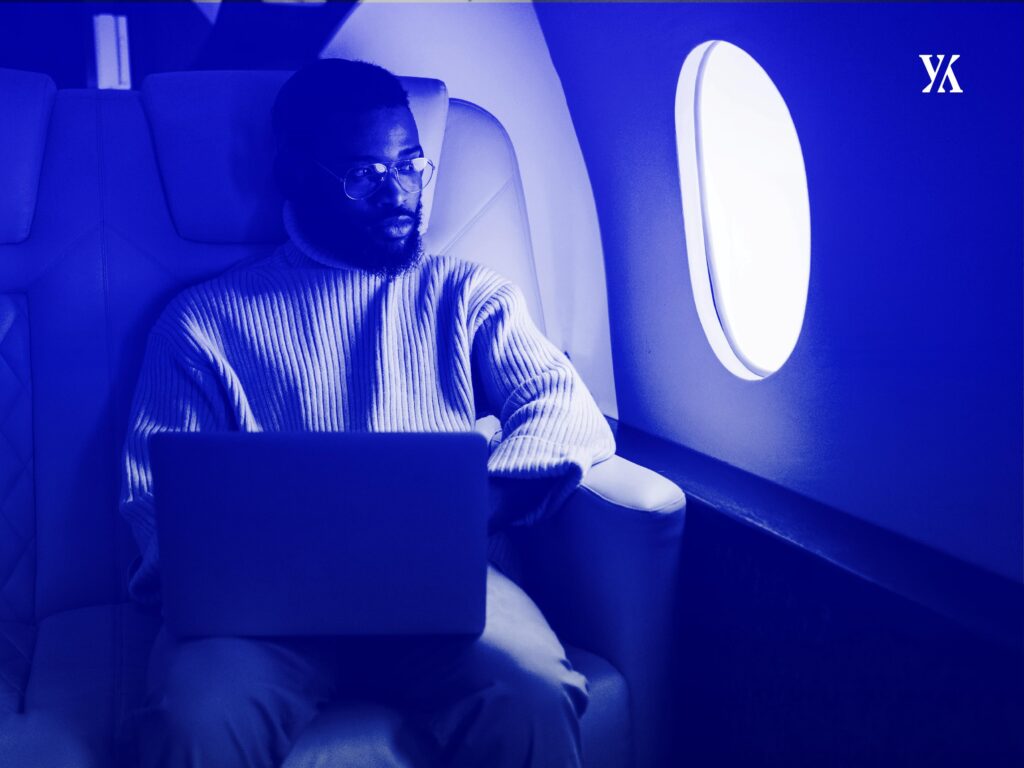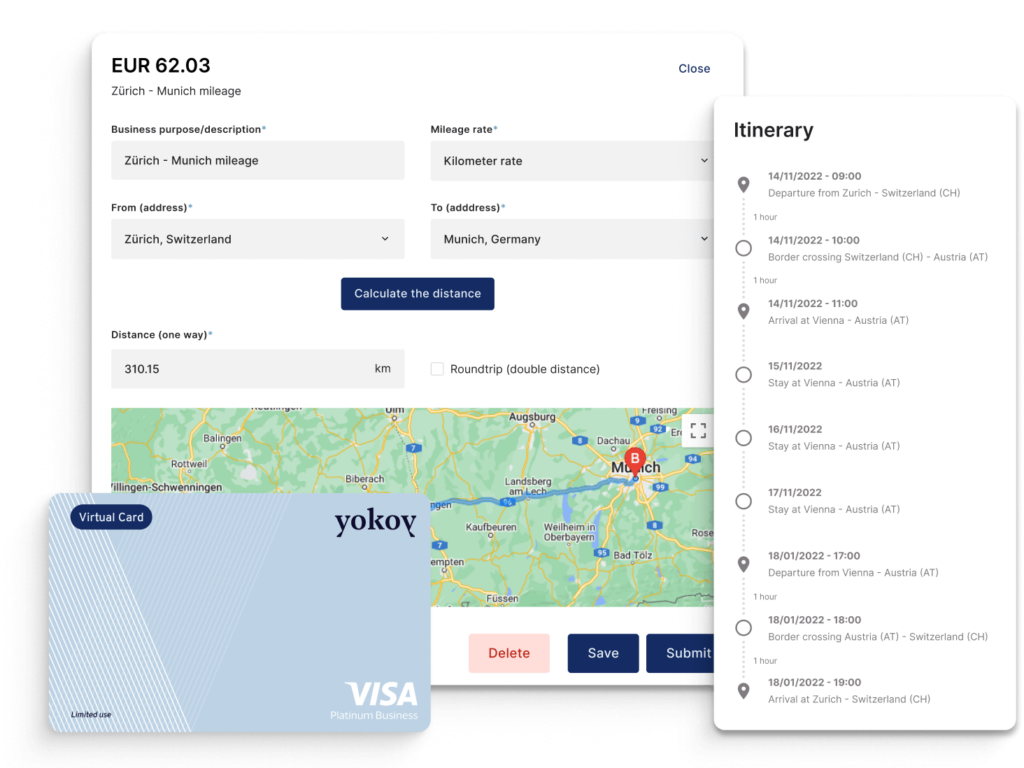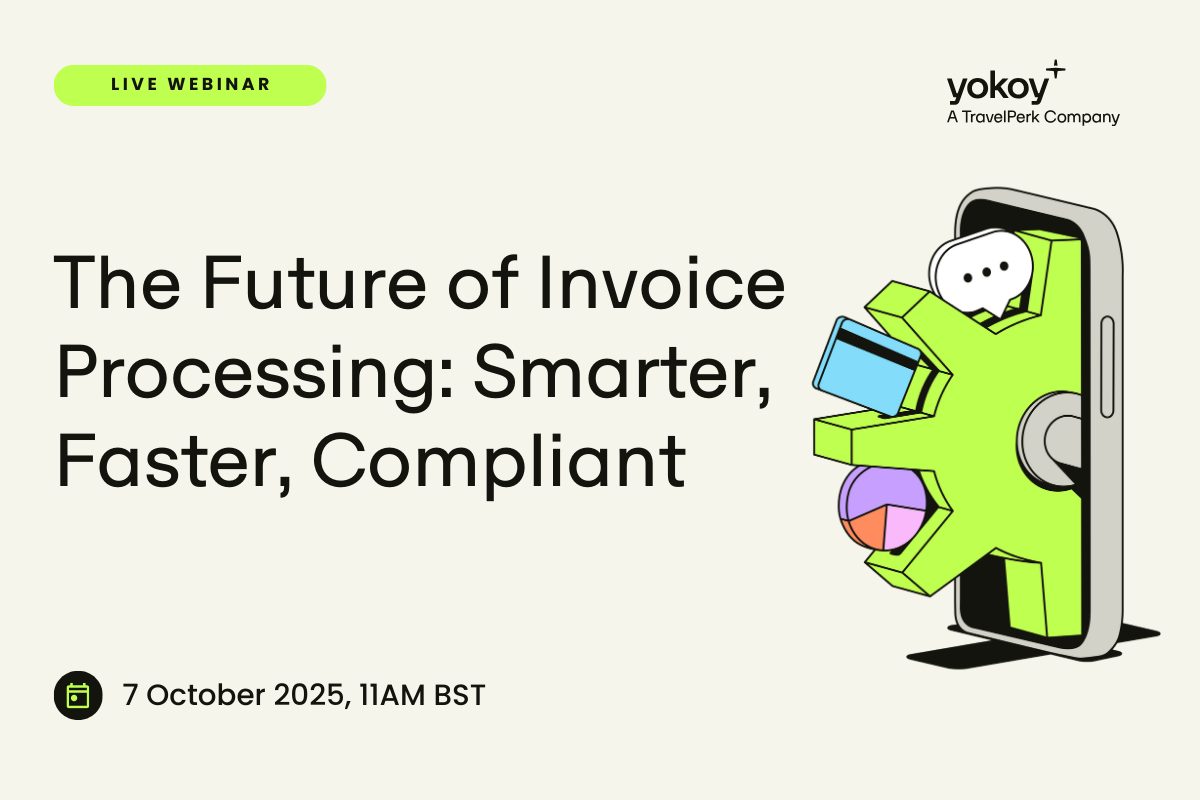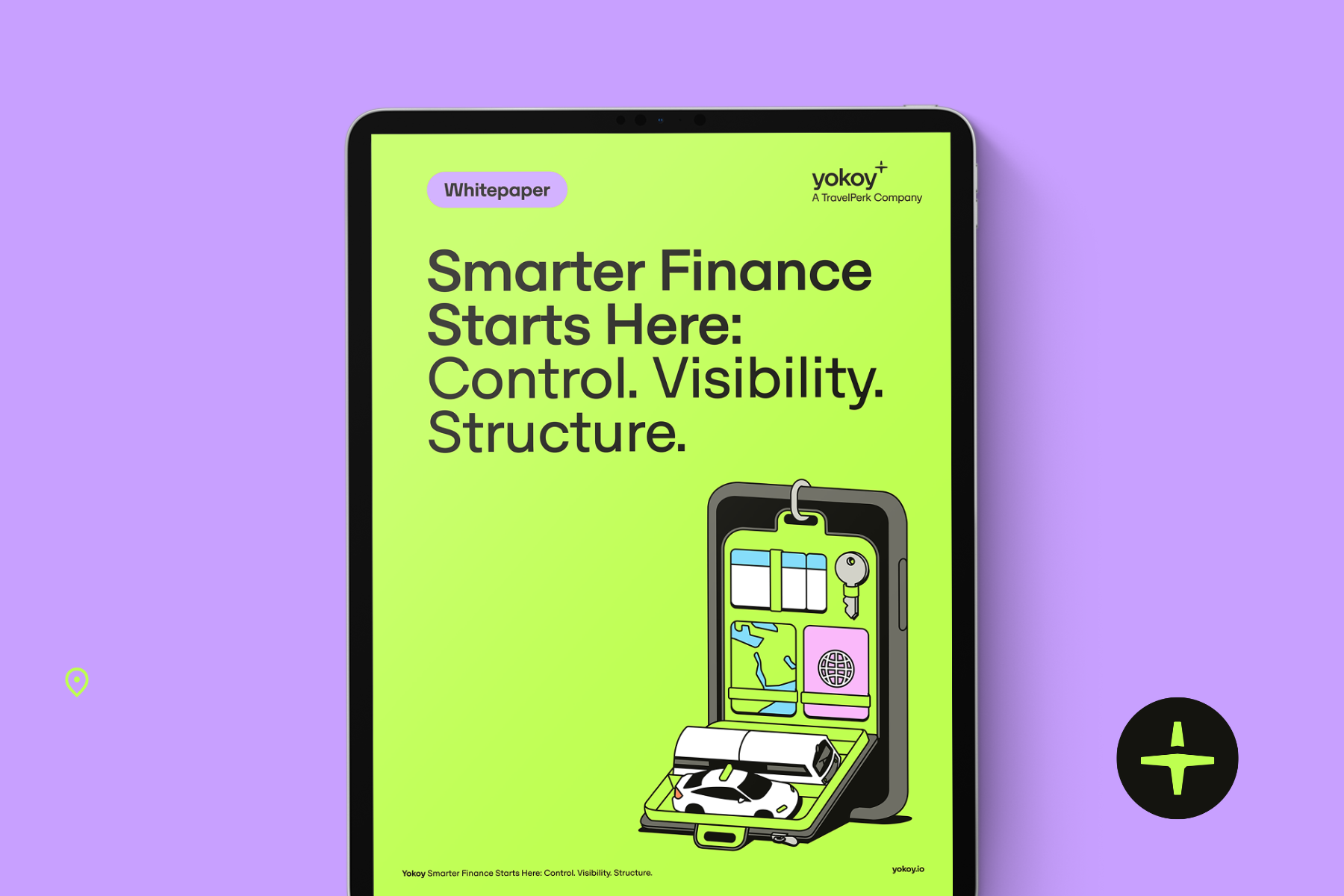Home / HMRC Travel Expenses: A Guide to Compliance and Claiming
HMRC Travel Expenses: A Guide to Compliance and Claiming
- Last updated:
- Blog

Managing travel expenses can be daunting for any business, especially when balancing the need for efficiency with strict compliance with HMRC regulations. Whether handling countless receipts, navigating complex approval processes, or ensuring every claim meets tax requirements, the traditional approach to travel expense management is often time-consuming and prone to errors. This article will explore how the conventional reimbursement process works, what its challenges are, and how Yokoy’s innovative platform can transform your business.
What are HMRC travel expenses?
HMRC travel expenses are actual costs that an employee incurs while performing their duties away from their usual place of work. These can include various expenditures, such as transportation, accommodation, meals, and other related costs arising during business trips. Understanding what qualifies as a travel expense under HMRC regulations is essential for your business to ensure compliance and make accurate tax relief claims. HMRC has specific rules for each type of travel expense, particularly concerning what can be claimed for tax relief and how these claims should be documented.
The importance of compliance with HMRC rules
Staying compliant with HMRC rules for travel expenses is not always easy. Officials have clear-cut guidelines on what qualifies as a legitimate travel expense. The problem: If your company mistakenly reports or claims non-qualifying expenses, it could trigger an unpleasant investigation, which can be time-consuming, disruptive, and costly. Even honest mistakes, like poor record-keeping, can make your business pay fines. That is why keeping detailed and accurate records of all travel-related costs is essential.
Conversely, your business can maximise the tax relief available on these expenses by following HMRC’s guidelines. A tax return can reduce your overall business costs more effectively and improve your company’s financial health. Another thing to keep in mind is that compliance builds trust. It shows employees, investors, and auditors that your business is committed to doing things correctly. This approach can help you strengthen your reputation and foster better relationships with clients and partners.
What qualifies as a travel expense?
Specific criteria must be met to claim expenses as travel expenses under HMRC rules. The primary requirement is that the expense be incurred wholly, exclusively, and necessarily for business purposes. This means the cost must be directly related to the employee’s duties and not for personal benefit. The travel must be required for work, and the expenses should not be excessive or beyond what is reasonable for the situation.
Allowable expenses
Allowable expenses are those costs that meet HMRC’s criteria for business-related travel and can be claimed for tax relief:
Public transportation costs: Expenses for business travel by train, bus, tram, or aeroplane
Business mileage: If an employee uses their personal vehicle for business travel, they can claim a mileage allowance
Parking Fees: Parking costs incurred during business travel
Tolls: Fees for toll roads or bridges
Meals: Reasonable costs for food and drink during business travel
Accommodation: Costs for overnight stays in hotels or lodging
Other incidental expenses: Minor costs such as tips, business phone calls, or laundry services
Non-allowable expenses
Non-allowable expenses do not meet HMRC’s criteria and cannot be claimed for tax relief:
- Personal travel: Any travel expenses incurred for personal reasons or combined personal and business trips
- Fines: Costs related to parking fines, speeding tickets, or other penalties incurred during business travel
- Commuting from home to the permanent workplace: Regular travel between an employee’s home and their permanent workplace
Temporary vs. permanent workplaces
A permanent workplace is where an employee regularly performs their duties. Travel between home and a permanent workplace is considered ordinary commuting and is not an allowable expense. A temporary workplace is where an employee is required to work for a limited period. Travel expenses to a temporary workplace can generally be claimed, as this travel is considered business-related.
For instance, if an employee is typically based in London but needs to work in Manchester for a three-month project, the travel costs to Manchester can be claimed as a business expense. However, travel to Manchester would be considered commuting if the employee is permanently transferred to Manchester.
Home-based employees
For home-based employees, the home is considered their permanent workplace. Travel expenses from home to other locations for work purposes can generally be claimed, as these trips are necessary for business.
For example, if a home-based employee needs to visit a client’s office, the travel costs to and from the client’s location are allowable. However, if they travel to the company’s office, whether this is allowable depends on whether that office is a temporary or permanent workplace.
Yokoy Expense
Streamline your travel and expense management
Say goodbye to manual data entry, lost receipts, and complicated reimbursements. Yokoy handles everything from start to finish, for simple T&E management at any scale.

Fuel rates for company vehicles
When employees use company cars, fuel costs can be claimed based on HMRC’s approved mileage rates. These rates cover fuel and maintenance costs, and they differ depending on the type of vehicle.
Advisory fuel rates (as of August 2024 – rates are updated quarterly):
Petrol:
- Up to 1400cc: 13p per mile
- 1401cc to 2000cc: 15p per mile
- Over 2000cc: 24p per mile
Diesel:
- Up to 1600cc: 12p per mile
- 1601cc to 2000cc: 14p per mile
- Over 2000cc: 18p per mile
LPG:
- Up to 1400cc: 11p per mile
- 1401cc to 2000cc: 13p per mile
- Over 2000cc: 21p per mile
Advisory electric rate:
- 7p per mile for electric vehicles
Additionally, per diem rates for subsistence can be claimed to cover the costs of meals and incidental expenses during business travel.
Upper subsistence costs:
- One meal (5 hour) ceiling: £5
- Two meal (10 hour) ceiling: £10
- Three meal (12 hour) ceiling: £15
- 24-hour ceiling: £25
For trips exceeding 24 hours, you can also claim the room and per diem rates.
Examples
Let us elaborate on how the rates can apply in practice:
Business trip with extended personal vacation
An employee travels to Paris for a three-day business conference and extends the trip by three additional days for a personal vacation. The travel expenses for the first three days related to the conference (including transportation, accommodation, and meals) are allowable. However, costs incurred during the additional three days of personal vacation (such as extra hotel nights or personal meals) cannot be claimed.
Permanent vs. temporary workplace
An employee who works at a permanent office in London needs to spend one week every month in a temporary office in Birmingham. The expense claims for travelling to Birmingham, including accommodation and meals, are valid because Birmingham is considered a temporary workplace. However, travelling to the permanent office in London would not be claimable as it is regular commuting.
Home-based employee visiting the office
A home-based employee travels to the company’s main office weekly for meetings. If the home is considered a permanent workplace, travel to the office could be allowable, depending on whether the office visit is necessary and not regular commuting. The expenses could be claimed if the office is designated as a temporary workplace for those visits.
The traditional reimbursement process decoded
The traditional reimbursement process is often a long and tedious journey for employees who incur expenses and for the finance department responsible for managing these claims. Let’s break down the steps involved in this process to understand its complexity and challenges.
The process begins when an employee incurs expenses for business purposes by paying cash or with a debit or credit card. This already burdens the employee, who must keep track of all the receipts and expenditures. After the trip, the employee must collect and organise all the receipts. The employee must ensure each is adequately documented, noting the date, location, purpose, and amount spent. This step is crucial because any missing or unclear receipt can result in the expense being rejected.
Next, the employee fills out an expense report, typically entering each expense’s details into a standardised form or software system. This can be time-consuming, especially if the employee has multiple receipts to process. The employee must ensure that each entry is accurate and complies with company policy, which can add to the complexity. Once the report is complete, the employee submits it to their manager or the finance department. There may be back-and-forth communication if the manager or finance department has questions or needs additional documentation.
The finance department then reviews the submitted expense report. This involves cross-checking receipts, ensuring the claims fall within allowable limits, and checking that the expenses are directly related to business activities. Any discrepancies or errors must be flagged and clarified, which can cause further delays. After the finance department approves the expense report, the reimbursement is processed. The employee finally receives the funds back into their account, often weeks after the expenses were incurred initially.
HMRC's requirements for the reimbursement process
It’s important to note that HMRC has specific requirements that businesses must adhere to during the reimbursement process.
All reimbursed expenses must be supported by clear and accurate documentation. This includes keeping original receipts or invoices detailing the expense’s nature, amount, and incurred date. Digital copies are acceptable, but they must be legible and include all the relevant details.
Every reimbursed expense must be incurred wholly and exclusively for business purposes, and the business purpose must be clearly stated in the expense report.
Expenses must be reasonable in amount. For example, opting for a mid-range hotel instead of a luxury suite would generally be considered reasonable.
HMRC expects expenses to be reported and reimbursed promptly. Delays in processing expenses can complicate record-keeping and increase the risk of errors.
Blog article
How to Choose the Ideal Expense Management Software: Requirements and Features
How to choose the best expense management software for your company size. Improve efficiency and save costs with the right expense tracking solution.

Lars Mangelsdorf,
Co-founder and CCO
Managing travel expenses the easy way with Yokoy
As outlined earlier, the traditional reimbursement process can be overwhelming, time-consuming, and prone to errors. However, with Yokoy’s advanced expense management platform, businesses can transform this cumbersome process into a streamlined, efficient, and compliant system. Let us explore how Yokoy simplifies travel expense management while ensuring full compliance with HMRC regulations.
Standardised travel expense policies that are clearly communicated
One of the biggest challenges is ensuring that employees understand and adhere to the company’s travel policies. Yokoy makes it easy to establish and communicate standardised travel expense policies across your organisation. These policies can be customised to align with your business’s specific needs and official regulations, ensuring all employees know what is allowed.
Yokoy’s platform allows you to automatically enforce these policies at every step of the expense reporting process. Employees are guided by clear, consistent rules, reducing the risk of non-compliant claims. This simplifies the process for employees and gives your finance team confidence that expenses are handled correctly from the get-go.
Streamlining the process with expense management software
Yokoy goes beyond essential expense management by offering end-to-end travel integration and centralising all bookings and related expenses on one platform. This streamlines the process and makes it easier for the finance team to monitor and manage travel expenses. Furthermore, employees no longer need to manually enter every detail of their expenditures. With Yokoy, they can snap a photo of their receipts, and the AI-powered system automatically extracts and categorises the relevant information.
Ensuring compliance by training the Yokoy AI with internal and external regulations
For optimal support, Yokoy’s AI is trained on your company’s internal policies and external regulations, including HMRC’s guidelines.
- Yokoy’s AI checks each expense automatically against policies the finance team controls including company policies or even HMRC guidelines
- Yokoy allows you to set customisable compliance rules tailored to your business’s needs.
Keep records to support tax relief claims and avoid potential penalties
Yokoy digitises and stores all receipts, expense reports, and approval records, making retrieving the necessary documentation during tax filings or audits easy. This reduces the administrative burden and ensures you are always prepared to support your claims. Moreover, Yokoy’s platform creates a clear audit trail for every expense, documenting who submitted it, who approved it, and how it was reconciled.
Stay in control thanks to custom approval workflows
With Yokoy, you maintain complete control over the approval process. The platform allows you to create custom approval workflows that match your organisation’s structure and needs. Approvers receive real-time notifications when expenses require their attention, speeding up the approval process and reducing delays.
Next steps
Effectively managing travel expenses involves understanding what qualifies as an allowable cost, maintaining precise records, and adhering to HMRC regulations to avoid penalties. Traditional methods can be cumbersome, but businesses can simplify the entire process with a modern solution like Yokoy. Our powerful solution streamlines expense management, ensures compliance with HMRC rules, and empowers your team to handle travel expenses efficiently, leaving you more time to focus on growing your business.
In this article
Simplify your invoice management
Book a demoRelated content
If you enjoyed this article, you might find the resources below useful.


